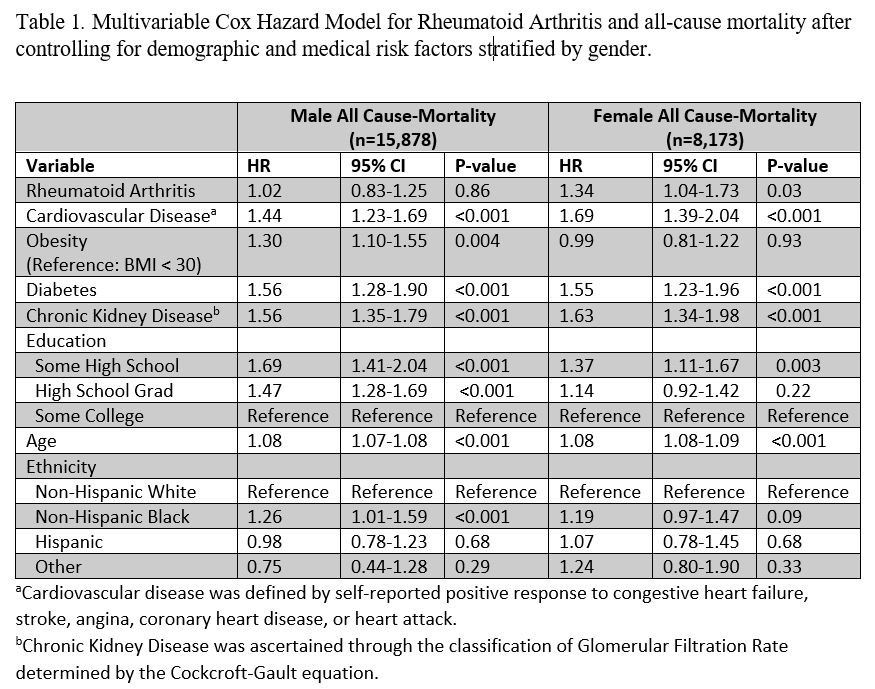Session Information
Date: Sunday, November 7, 2021
Title: Epidemiology & Public Health Poster II: Inflammatory Arthritis – RA, SpA, & Gout (0560–0593)
Session Type: Poster Session B
Session Time: 8:30AM-10:30AM
Background/Purpose: Rheumatoid arthritis (RA) is a chronic and systemic autoimmune disease which predominantly affects joints with varying severity. While RA has been found to be more prevalent in women, there is conflicting information about gender-specific mortality rate as it relates to RA. In this study, we explored the relationship between RA and all-cause mortality and if gender modifies this effect.
Methods: The study was conducted on participants aged 20 years or older in the United States living. We assessed RA status by using the arthritis screening in the NHANES survey for the years 1999 to 2010 with mortality follow-up through December 31, 2015. Prospective analysis was performed using complex samples Cox Regression with adjustment for known confounders to determine the relationship of RA and mortality, especially as it pertains to gender.
Results: Prevalence of RA in this population (N=27,371) was 1.9% among males and 2.8% among females. The mean follow-up was 11.1 years. For all-cause mortality, the overall unadjusted hazard ratio (HR) of rheumatoid arthritis to no rheumatoid arthritis was 2.89 (95% confidence interval [CI], 2.48-3.37, p < 0.001). Adjusted HR was elevated, 1.34 (CI 1.04-1.73, p < 0.05), among female participants with RA but closer to 1.0 (1.02 CI 0.83-1.25, p > 0.05) among male participants with RA, after controlling for medical (obesity, diabetes, CKD, and CVD) and demographic risk factors (age, education, and food insecurity).
Conclusion: RA was found to cause three times higher mortality rate than the general population, which is higher than previous estimates. The findings also show that RA disproportionately affects females and also leads to worse outcome than in males. Risk scoring and social policy, when addressing RA, should address gender disparities related to outcomes.
To cite this abstract in AMA style:
Banerjee S, Falls S. Gender Modifies the Effect of Rheumatoid Arthritis on All-Cause Mortality [abstract]. Arthritis Rheumatol. 2021; 73 (suppl 9). https://acrabstracts.org/abstract/gender-modifies-the-effect-of-rheumatoid-arthritis-on-all-cause-mortality/. Accessed .« Back to ACR Convergence 2021
ACR Meeting Abstracts - https://acrabstracts.org/abstract/gender-modifies-the-effect-of-rheumatoid-arthritis-on-all-cause-mortality/

